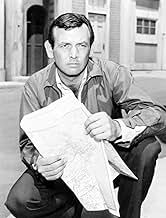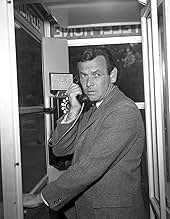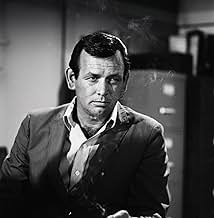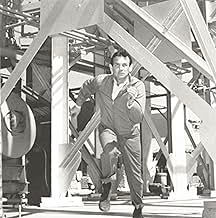After being on the run for 6 months, Richard Kimble falls in love with a beautiful woman who has a young son. She also has a physically abusive, estranged husband, that wants Kimble out of t... Read allAfter being on the run for 6 months, Richard Kimble falls in love with a beautiful woman who has a young son. She also has a physically abusive, estranged husband, that wants Kimble out of town, or dead.After being on the run for 6 months, Richard Kimble falls in love with a beautiful woman who has a young son. She also has a physically abusive, estranged husband, that wants Kimble out of town, or dead.
Paul Birch
- Captain Carpenter
- (uncredited)
Lynn Borden
- Bus Passenger
- (uncredited)
George Bruggeman
- Bar Patron
- (uncredited)
William Conrad
- Narrator
- (voice)
- (uncredited)
Dabbs Greer
- Sgt. Fairfield
- (uncredited)
Donald Losby
- Mark Welles
- (uncredited)
Rod McGaughy
- Bar Patron
- (uncredited)
Bryan O'Byrne
- Ticket Agent
- (uncredited)
Barney Phillips
- Cleve Brown
- (uncredited)
Maudie Prickett
- Miss Blaine (the babysitter)
- (uncredited)
Abigail Shelton
- Evelyn
- (uncredited)
Carl Sklover
- Bar Patron
- (uncredited)
Dick Wesson
- Introductory Narrator
- (voice)
- (uncredited)
- Director
- Writers
- All cast & crew
- Production, box office & more at IMDbPro
Featured reviews
Watched 'Fear in a Desert City', (1963) an episode of The Fugitive today with David Janssen as Dr. Richard Kimble, on the run, until he can prove his innocence. I recall avidly watching this series & being absolutely in awe, of the acting 'teeth' of Janssen~ Such a fine & respected actor. Poignant exchanges with Vera Miles when he spilled his guts as to his true identity & his soul goal until he could clear his name. The lonely stroll down an anonymous street in an inhospitable city, encountering a kitten, which he picks up & comforts echoed his own plight.... This series, produced in the 60's had everything, great actors, pithy story lines & William Conrad's resonant narration moving the narrative along. Pulsating instrumental music adding depth to the most suspenseful themes, as Kimble followed his quest....to remain anonymous until he hunted down his wife's killer....'Another journey, another place. Walk neither too fast nor too slow. Beware the eyes of strangers. Keep moving'....I absolutely revered him as an actor....
This classic series begins with an extended version of its eventual opening as we see Richard Kimble handcuffed to Lt. Gerard in a train, on his way to the death house, (today he'd be on his way to death row for decade or more). The train derails and we see Kimble escaping with the now broken handcuffs. Then we jump 6 months later and Kimble is in Tucson, Arizona. William Conrad's narrator, (sounding much like Mark Hellinger in the 1948 movie of Naked City), tells us it's 6 months later and describes Kimble's plight , traveling the country looking for the one-armed man he thinks killed his wife while avoiding Gerard, who is obsessed with recapturing him. "Another journey, another place. Walk neither too fast nor too slow. Beware the eyes of strangers. Keep moving."
Kimble finds a job as a bartender where he develops a relationship with a piano player (Vera Miles) and a very unwanted feud with her possessive and abusive husband, (Brian Keith). Keith is rich and influential and totally crazy, the last thing Kimble needs in his life. Miles is pretty and sensitive, which is something he does need, but scared. She also has a son who is scared for his mother. Kimble tries to leave with them but fate, of course, moves its huge hand.
I think Kimble sees in this woman and her son the family he could have had, making it particularly poignant. That's why I would like to have seen them return for the finale four years later. I would also like to have heard more of the narration from Conrad, highlighting the story and giving voice to Kimble's thoughts, instead of just describing the beginning and end of episodes, as does for most of the series.
Kimble finds a job as a bartender where he develops a relationship with a piano player (Vera Miles) and a very unwanted feud with her possessive and abusive husband, (Brian Keith). Keith is rich and influential and totally crazy, the last thing Kimble needs in his life. Miles is pretty and sensitive, which is something he does need, but scared. She also has a son who is scared for his mother. Kimble tries to leave with them but fate, of course, moves its huge hand.
I think Kimble sees in this woman and her son the family he could have had, making it particularly poignant. That's why I would like to have seen them return for the finale four years later. I would also like to have heard more of the narration from Conrad, highlighting the story and giving voice to Kimble's thoughts, instead of just describing the beginning and end of episodes, as does for most of the series.
While one certainly doesn't have to see the pilot it would add to the impact of the first episode. The basics: Kimball's running from a death sentence by what, indeed, the show calls "fate's big hand" which has given Kimball his escape. The running has a means to its end which is beyond surviving the wrongful death sentence. Kimball is actively looking for the real murderer, the "one-armed man" which he sees as justice for his wife and, now, his own life.
QM Productions have high standards, often inserting top-shelf actors/actresses on their way up. Here it is Vera Miles and Brian Keith. The rest of the cast is also much better than average. Of course to get by Kimball needs to hide his real identity while taking on work. He has chosen the name of Jim Lincoln. Working at a local Tucson neighborhood watering hole as a bartender makes good sense in that he can be relatively anonymous while keeping his eyes and ears open hoping for the miracle of any information on the man with one arm. We are immediately aware of Kimball's character: intelligence, humbleness, and empathy is, perhaps, his achielles heel too in a world where those possessing the opposite traits rise up. Miles plays the role of a wickedly oppressed estranged wife from her wealthy and powerful husband played by Keith. Keith is a very visible stalker seeking out his wife with no regard to the estranged nature of their separation. He is going to have her and if any one comes between that he will do whatever it takes to make sure the person is eliminated. This is exactly the kind of volatile situation Kimball doesn't need as Lt. Gerrard's constant pressure is quite palpable. Even so, the good man who is Kimball inserts himself as Mile's protector and possible love interest all while Kimball knows the later can never be.
This is the winding road beginning for Richard Kimball. One that will repeat many more times in the coming 120 episodes. What keeps it vital is the human element Kimball seems so perfect crafting. He personifies the best of humanity along with his heavy burden of constant fear. Playing this out in what almost seems like a travelog of the very different and impressive locales in the American landscape, along with memorable co-stars and characters, is the final part of a masterpiece of TV drama. In my estimation the best, if not at least, one of the top two or three TV series of all time.
QM Productions have high standards, often inserting top-shelf actors/actresses on their way up. Here it is Vera Miles and Brian Keith. The rest of the cast is also much better than average. Of course to get by Kimball needs to hide his real identity while taking on work. He has chosen the name of Jim Lincoln. Working at a local Tucson neighborhood watering hole as a bartender makes good sense in that he can be relatively anonymous while keeping his eyes and ears open hoping for the miracle of any information on the man with one arm. We are immediately aware of Kimball's character: intelligence, humbleness, and empathy is, perhaps, his achielles heel too in a world where those possessing the opposite traits rise up. Miles plays the role of a wickedly oppressed estranged wife from her wealthy and powerful husband played by Keith. Keith is a very visible stalker seeking out his wife with no regard to the estranged nature of their separation. He is going to have her and if any one comes between that he will do whatever it takes to make sure the person is eliminated. This is exactly the kind of volatile situation Kimball doesn't need as Lt. Gerrard's constant pressure is quite palpable. Even so, the good man who is Kimball inserts himself as Mile's protector and possible love interest all while Kimball knows the later can never be.
This is the winding road beginning for Richard Kimball. One that will repeat many more times in the coming 120 episodes. What keeps it vital is the human element Kimball seems so perfect crafting. He personifies the best of humanity along with his heavy burden of constant fear. Playing this out in what almost seems like a travelog of the very different and impressive locales in the American landscape, along with memorable co-stars and characters, is the final part of a masterpiece of TV drama. In my estimation the best, if not at least, one of the top two or three TV series of all time.
10ynot-16
This, the first episode, is a very fitting beginning to the saga of Dr. Richard Kimble, fugitive. Kimble (using the name Jim Lincoln) takes a job at a bar in Tucson, Arizona, and meets the piano player, Monica Welles, played by actress Vera Miles. Monica is bothered by a male patron of the bar. Kimble repeatedly protects her, thereby acquiring an enemy. He later learns the man bothering her is Ed Welles, her husband. Actor Brian Keith does an outstanding job as Ed.
Ed Welles is a major landowner in the state, with enormous influence over the police. He is also paranoid, jealous, controlling and violent where his wife is concerned. She fled Phoenix to Tucson a month earlier to get away from Ed, but he found her and followed her.
Kimble takes the opportunity to explain his story to Monica, thereby informing viewers about why he is on the run. Due to his impeccable, protective behavior, she of course believes in his innocence. Meanwhile, we see Lieutenant Gerard back in Stafford discussing the case with Captain Carpenter. Carpenter suggests that maybe Kimble is innocent, but Gerard declares it does not matter to him whether Kimble is factually innocent or guilty. The law declared him guilty, and it is not up to Gerard to decide on guilt or innocence, but merely to obey the law and bring in the fugitive.
Child actor Donald Losby (who later plays Sean in "Cry Uncle") plays Monica's son, who at first is cold to Kimble, but later comes to like and trust him more than his own dad.
Actors Harry Townes and Dabbs Greer are very credible as the two police officers whom Ed employs to chase Kimble out of town. Kimble faces severe danger from the police, and from the violent behavior and desire for revenge of Ed Welles.
Ed Welles is a major landowner in the state, with enormous influence over the police. He is also paranoid, jealous, controlling and violent where his wife is concerned. She fled Phoenix to Tucson a month earlier to get away from Ed, but he found her and followed her.
Kimble takes the opportunity to explain his story to Monica, thereby informing viewers about why he is on the run. Due to his impeccable, protective behavior, she of course believes in his innocence. Meanwhile, we see Lieutenant Gerard back in Stafford discussing the case with Captain Carpenter. Carpenter suggests that maybe Kimble is innocent, but Gerard declares it does not matter to him whether Kimble is factually innocent or guilty. The law declared him guilty, and it is not up to Gerard to decide on guilt or innocence, but merely to obey the law and bring in the fugitive.
Child actor Donald Losby (who later plays Sean in "Cry Uncle") plays Monica's son, who at first is cold to Kimble, but later comes to like and trust him more than his own dad.
Actors Harry Townes and Dabbs Greer are very credible as the two police officers whom Ed employs to chase Kimble out of town. Kimble faces severe danger from the police, and from the violent behavior and desire for revenge of Ed Welles.
10Guad42
The plot for this first show has been well covered by others so just a couple of comments.
This episode shows three themes that will be hallmarks of this show's four-year run. First, as with all QM productions, the guest stars are always first rate. This is not only true with the main characters portrayed by Brian Keith and Vera Miles, but also the supporting characters acted out by Harry Townes, Dabbs Greer, and Barney Phillips. All were well established actors and probably cost a little more than other lesser-known performers, but QM always maintained these standards.
Second, the standard Fugitive plot device of Kimble helping out people when he would be better served to run is first seen here. Despite the bad guy have influence with the police and a deteriorating situation, Kimble doesn't run but stays and helps. We will see that about a hundred more times over four years.
Third, women falling for Kimble will be another situation we will see many times. Of course, it is created by the writers, but I give David Janssen lots of credit here. He is a likeable guy with a bit of vulnerability mixed in. If you read many of the comments made by co-stars over the years, he was a nice guy in real life too. Many reviewers, me among them, had wished the producers had brought back one of the many women that Kimble had meet along the way for the two part series finale rather than create a new character just for the ending. I had opted for Suzanne Pleshette or Janice Rule but Vera Miles would have been a great choice. Having her there at the beginning and the ending would have been nice symmetry.
A great start to a superb series. Enjoy!
This episode shows three themes that will be hallmarks of this show's four-year run. First, as with all QM productions, the guest stars are always first rate. This is not only true with the main characters portrayed by Brian Keith and Vera Miles, but also the supporting characters acted out by Harry Townes, Dabbs Greer, and Barney Phillips. All were well established actors and probably cost a little more than other lesser-known performers, but QM always maintained these standards.
Second, the standard Fugitive plot device of Kimble helping out people when he would be better served to run is first seen here. Despite the bad guy have influence with the police and a deteriorating situation, Kimble doesn't run but stays and helps. We will see that about a hundred more times over four years.
Third, women falling for Kimble will be another situation we will see many times. Of course, it is created by the writers, but I give David Janssen lots of credit here. He is a likeable guy with a bit of vulnerability mixed in. If you read many of the comments made by co-stars over the years, he was a nice guy in real life too. Many reviewers, me among them, had wished the producers had brought back one of the many women that Kimble had meet along the way for the two part series finale rather than create a new character just for the ending. I had opted for Suzanne Pleshette or Janice Rule but Vera Miles would have been a great choice. Having her there at the beginning and the ending would have been nice symmetry.
A great start to a superb series. Enjoy!
Did you know
- TriviaThis series was loosely based on Victor Hugo's novel "Les Miserables". The writer of this episode, Stanford Whitmore, has said that he chose the surname "Gerard" for Kimble's pursuer because it sounded similar to "Javert," who pursues Jean Valjean in "Les Miserables".
- GoofsA closeup shot of the train losing control is apparently of a toy train.
- ConnectionsEdited from The Fugitive (1963)
- SoundtracksI'll Never Smile Again
(uncredited)
Written by Ruth Lowe (1940)
[Performed at the Branding Iron bar by Vera Miles' character, Monica Welles]
Details
- Release date
- Country of origin
- Language
- Filming locations
- 7100 block of Willoughby between LaBrea and Romaine, Los Angeles, California, USA(RR tracks in ending scene with kitten and RR crossing sign in ending shot, used in ending credits)
- Production companies
- See more company credits at IMDbPro
- Runtime
- 51m
- Color
- Aspect ratio
- 1.33 : 1
Contribute to this page
Suggest an edit or add missing content



























